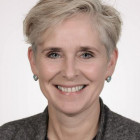Presentations
Trusted and Secure Digital Credentials and Degrees
Date Thursday, Dec 2 Time – Room: Tiergarten
Discover the potential, challenges, and opportunities that digital credentials are able offer. From implementing to creating and from issuing to transferring: speakers in this session will share best practices.

Helen Gray
International project development Manager, IÐAN education centre, Iceland
Helen Gray is the International Development Manager at IÐAN Education Centre in Iceland. She holds a BS in Administration Dietetics from Umeå University, Sweden, an MA in Pedagogy from the University of Iceland, and a teaching qualification. With over 20 years in the vocational education and training (VET) sector, Helen has led research and development at IÐAN for 15 years, contributing to both national and international initiatives in initial VET (IVET), continuing VET (CVET) and continuous professional development (CPD). Currently, she is focused on advancing digital transformation in education.
Links

Andreas Wittke
Head of Platform & Blockchain Development, Technical University of Applied Sciences Lübeck, Germany
Andreas Wittke is the CDO (Chief Digital Officer) of the Institute for Digital Learning at Luebeck University of Applied Sciences and of oncampus – a wholly owned subsidiary of Lubeck University of Applied Sciences.
Holding a degree in Electrical Engineering, Andreas is a specialist in the fields of Digital Transformation, Innovation and Educational Technologies in higher education. He has invented the interactive MOOC platform mooin (www.oncampus.de) and the cloud based authoring tool LOOP (https://loop.eduloop.de/). Organized by the federal state of Schleswig Holstein, Andreas visited both Silicon Valley in 2016 and Shanghai in 2018. As a project manager of various international MOOC projects, Andreas publishes articles on www.onlinebynature.com and on Twitter under @onlinebynature. Andreas is a keynotespeaker and he organizes various events, among them the Moodlemot DACH and the Barcamp Luebeck.
Andreas’s current research focuses on a Quorum Blockchain for digital certificates using a Moodle interface (www.digicerts.de) and is Head of Platform development for the FutureSkills project (https://futureskills-sh.de/de/).
Links
Moderator

Rolf Reinhardt
Member of the Executive Committee, International Council on Badges and Credentials [ICoBC], Germany
Rolf Reinhardt works for LinkedIn at the intersection of government, education and organizational learning. He is also an active member of the International Council on Badges and Credentials [ICoBC] to ensure a systemic view of badges and credentials for individuals, organizations and societies. Additionally, he serves as a Council Member to the Union of International Associations, as a Council Member to the OEB Global and as a Certified Supporter to the Corporate Social Responsibility community of ZiviZ at Stifterverband (W.I.E.). Prior to joining LinkedIn in 2016, he worked for Pearson, the largest education company in the world, on secondary, post-secondary and corporate training initiatives across Germany, Austria and Switzerland.
From 2011 to 2012, Rolf was tinkering on various visionary projects such as eLearning quality (epprobate), streaming (TEDx etc.), ePortfolios, Immersive Worlds, Networks of Change Structures as well as Coworking and Community Spaces.
The focus of his work from 2007 till 2009 was on the ROI of eLearning programs for larger corporations. This focus changed with his assignment as Executive Manager of the European Foundation for Quality in E-Learning where innovation and technology as an enhancer of personal, organisational and societal development became a central topic.
By the time he obtained his Engineering degree in Media Technology, Rolf worked on large digital transformation projects, for instance, for the L&D department of L’ORÉAL. Rolf later designed and managed complex eLearning projects mainly for corporate customers.
Blockchain in Digital Education: First Results and New Perspectives, Andreas Wittke
From this presentation, you will learn: what mobile credentials are; the importance of digital certificates in digital application processes and; what the most common European standards for higher education credentials are.
The importance of validation processes will be presented and how the verification of certificates via QR code as well as with JSON and PDF will be explained.
A deep understanding of the structure of digital certificates is generated and the connection to a smartphone wallet is explained.
After the presentation, participants can try out the technology themselves and get access to the open source code as well as an open online course where they can obtain a blockchain certificate themselves. In addition, the various blockchain technologies such as Bitcoin, Ethereum and Quorum will be briefly explained and the issue of energy consumption will be addressed. At the end, you will receive an outlook on other research areas in the field of education and blockchain.
Outcomes:
- What is a Blockchain
- What are the benefits of blockchain for digital certificates
- Metastandards for digital certificates
- Mobile credentials in international higher education
Transformation from Traditional Issuing of Credentials to Digital Credentials - Lessons Learnt, Helen Gray
IÐAN is a private non profit education and training provider supported by the federation of employees and unions in Iceland. This past year has taught us all a lesson in resilience. COVID-19 has done that and, at the same time, the accelerated digital transformation has as well.
Our training centre, IÐAN, is in the process of going through this transformation with all its growing pains. This presentation will discuss one of the processes our team has closely examined, which has led to the re-thinking of how certificates of completion are issued. It is no longer a question whether digital credentials will transform how we interact, attain, and share credentials. I look forward to sharing and discussing our* vision & process, the challenges we encountered, as well as the foreseen impact of the implementation of digital credentials in our organisation and sector.
*This has of course been a team effort, involving, amongst others: Sigurður Fjalar Jónsson, marketing manager at IDAN and teacher; Hildur Elín Vignir, managing director of IDAN who has led the debate on the behalf of crafts and trades regarding VET and CPD´s.
Outcomes:
- How to prepare for introducing and using digital credentials.
- Getting to know digital credentials, digital badges and transitional credentials.
- Ways to use digital credentials in your marketing.
- Making issuing of credentials more secure.
How Digitalising Multilingual Certification Programmes Can Drive the Deployment of Innovative Technologies
Over the last 12 months TÜV Rheinland has been digitalizing global content to deliver certification programmes worldwide. As a global TIC organisation with technical qualifications ranging from lead auditors to welders, many exams contain an essay, case study or practical element, also covering a multitude of languages worldwide. One of the pandemic challenges faced was that assessors could not travel and TÜV Rheinland needed a way to make sure customers could continue their certification path in spite of the adverse situation.
In this Presentation Sue will describe how TÜV Rheinland approached this challenge and focus on two case studies – the delivery and marking of diverse assessment types, such as essay questions for multilingual exams and the marking of practical exam for Electric/High Voltage technicians around the world with the assessor in the UK, candidates in Spain and Brazil and a global support team in Germany. TÜV Rheinland will share the lessons learned and the benefits for this approach in driving new technologies and opening new markets.